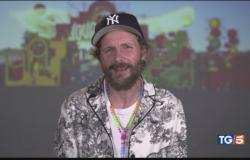For the more curious readers, many new publishing realities have been born in just a few months. Who build communities around books. And rituals
In recent months, numerous small publishing houses have made their debut in Italy. A surprising fact, if you think about the enormity of the proposals that invade the bookshops of our country. Do we really need new editorial realities, in a sea of releases that readers can barely notice? The answer is probably yes. And precisely because there are too many books.
Those who love to read, those who love to buy, those who love to collect or give books as gifts want to be guided and involved. What interests us most is the “object” itself: the object, and the experience around the object. New readers are attracted to the book-event. A book must be shown, it must seduce right from the cover, it must be part of a bigger picture. Readers are not only looking for a well-written story, but they want to participate in an event: reading, which is no longer a solitary activity, but a shared one. And even those who have not been fascinated by influencers still expect to be amazed. And this is why the news is awaited. Because they bring with them hope, that hope that pushes us to look around.
There are too many books that are part of the usual panorama, to which you get used. Having the chance to find treasures, to be surprised, to embark on a common exploratory journey, is more enjoyable. And probably those who have decided to get involved, to take a risk by opening a publishing house today, have the suspicion that the reader needs new stimuli and that he wants to participate in a journey that involves him, that makes him believe that in this sea you can still catch fish you’ve never seen before.
«We wanted to create a home for all the people who, like us, are looking for stories. Of authentic voices, of emotions.” Matteo Trevisani, one of the editors of the Roman publishing house Mercurio who debuted at the beginning of May with his first splatter, violent and shocking novel “Maeve”, by the American writer CJ Leede, explains thus why investing in such a complicated industry: «It is undoubtedly risky, but we believe we can meet a new audience that inhabits this world of ours». A new world where you are welcomed, pampered and directed towards a road built specifically for those who want to walk together. «Mercurio’s books are narratives on the threshold: on the border between literary genres, between today and tomorrow… They convene a collective ritual». Mercury’s books seem to come from a magical, slightly scary place. The next releases are playfully traced on a map that is very reminiscent of the one drawn in the pages of Treasure Island. They are perfect books for social media, collectibles and probably of excellent quality.
In March, however, the Wudz publishing house appeared in Milan, which deals with science, literature, art, music, cinema, history and economics. «The idea is to create a cultural ecosystem, an affiliation between different realities that share resources and knowledge and make interdisciplinarity their strong point». Ecosystem: a community of organisms living in the same environment. And in this environment they wait for those like them who are “not satisfied with linearity”. The editorial director Damiano Scaramella, writer and first editor of Il Saggiatore, writes that Wudz «is a place to be, where to pass, stop, discover something». And here too is the idea of a special place in which to spend time. A few months after its birth, Wudz – «phonetic transcription of the noun woods (woods, forest, forest)» – publishes authors such as Michel Houellebecq, Steven Spielberg, David Cronenberg.
But it didn’t end here. In October 2023, the Low publishing house was founded in Piacenza: «A great challenge, because if it is already difficult to survive in our country through culture, it is even more so in the form of a social cooperative. But this does not discourage us and we hope to reverse the trend, raising the stakes with Low’s new project”, underlines president Paolo Menzani. Finally the word challenge is pronounced. A word that is good for all these new publishers. Men and women who must be recognized for having the courage to turn their backs on pessimism. The editorial director Giovanni Battista Menzani explains: «We think we are making our contribution to the cultural debate of the country and to the circulation of ideas, values and themes that we have always been familiar with: fragility, inclusion, marginality, solidarity». With them a large slice of humanity becomes the protagonist of the project.
Also in October, Fuoriscena comes to light, a new publishing adventure – directed by Luisa Sacchi – which marks a further development of the RCS books area. «The name is a declaration of intent. It represents the very identity of the project: revealing what is not seen, what remains behind the scene, outside the media bubble. We want to try to tell stories in the most diverse narrative forms. I come from Chiarelettere and I will continue to be outside the power scene”, explains editor Maurizio Donati. Another community to inhabit, in which readers are alike in their search for the truth. Roberto Saviano has recently published “Noi due ci apparteriamo” for Fuoriscena, a novel that takes place in the world of organized crime, full of sex, intimacy, love and betrayal. And in May the publishing house Ribalta Edizioni debuted in bookstores with two titles. «We will donate a space to tell stories through the eternal medium of writing», declare those responsible. A publishing house with four series: “Finzione scenica”, dedicated to narrative forms taken from the theatrical performances of the same authors; “Ribalta in scene”, curated by the actor Edoardo Leo and intended for behind-the-scenes photo books; “Who is on stage” (which will debut in October), a series of complete theatrical texts; and “Luna Park”, dedicated to children.
Finally, at the beginning of the year, Topic was presented at Maxxi in Rome: a publishing house dedicated to in-depth non-fiction, founded by the journalist and author Marco Bolasco. Topic, they explain, “wants to define a new project space, which didn’t exist before, in which authors and readers can find each other” and hosts publications of a gastronomic, technical, scientific and informative nature.
In short, what we notice when examining the new and daring editorial existences is the desire to create a bond of trust with readers, where what counts is belonging, adhesion to the purposes and themes offered. Small worlds that, no more difficulties, are committed to defining a sometimes imprecise, but generous, possibility of collective identification.





